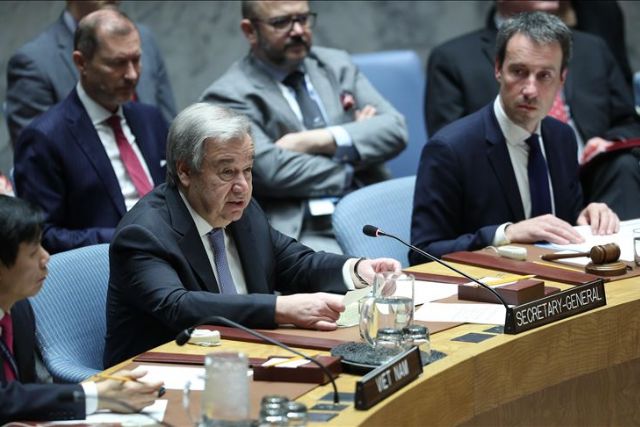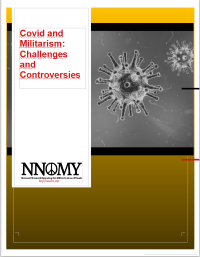
Fabiola Cardozo / NNOMY / español - It’s widely recognized that the Covid-19 pandemic undoubtedly affects the economy and, as a result, also negatively affects healthcare, education, and culture. However, in the face of hard times like the ones we’ve experienced this year, national priorities are oriented through the policies implemented by political leaders.
A recent article by the Washington Post highlights how The Pentagon diverted taxpayer money originally meant for masks and cotton swabs to make jet engine parts and body armor.
"The Cares Act, which Congress passed earlier this year, gave the Pentagon money to “prevent, prepare for, and respond to coronavirus.” But a few weeks later, the Defense Department began reshaping how it would award the money in a way that represented a major departure from Congress’s intent.
The payments were made even though U.S. health officials think major funding gaps in pandemic response still remain. Robert Redfield, director of the Centers for Disease Control and Prevention, said in Senate testimony last week that states desperately need $6 billion to distribute vaccines to Americans early next year. Many U.S. hospitals still face a severe shortage of N95 masks. These are the types of problems that the money was originally intended to address."
What are the real needs of the population during the pandemic? Should the National Defense sector be a priority now? Questions like this lead us to examine some data.
These are the 2019 US Poverty Statistics published by the US Census in September 2020:
- The child Poverty Rate is 14.4%, therefore, about one in six children are in a poverty status. This is a disturbing poverty statistic to many Americans because children are helpless to influence their living conditions.
- While the poverty rate for the population as a whole is 10.5% the rate varies greatly by race. Blacks have the highest poverty rate at 18.8% and Non-Hispanic whites the lowest at 7.3%. The Poverty rate for Blacks and Hispanics is more than double that of non-Hispanic Whites.
- Adults that work full time have a low Poverty Rate of 2.0%, which is not surprising. The 2.3 million full time workers that are in poverty generally have low paying jobs, such as a minimum wage job paying $16,000 per year, and have two or more children thus pushing the family into poverty. There are 42.9 million adults between the ages of 18 and 64 (working age) that are not working. They total 22% of working-age adults, but account for 61% of working-age adults in poverty.
- 14.4 million working-age adults have a disability which represents 7% of the workforce. They have a Poverty Rate of 22.5%. While this is a high rate of poverty it is less than the nonworking adult rate of 26.4%.
- The educational level attained by individuals has a dramatic impact on poverty. 23.7% of adults over 25 years old without a high school diploma are in poverty versus 3.9% for those with a college degree.
Covid-19 exacerbates other social crises and lays bare the inequalities that make children, seniors, Black people, immigrants, disabled, and people without access to education more vulnerable to poverty. This also means that they’re more likely to have a more intense experience navigating a humanitarian crisis that is characterized by the difficulty of accessing health care, a proper diet, and shelter as basic human rights. As it stands today, the landscape in the United States is defined by elevated unemployment rates, lower general income, and an increase in medical expenses, which makes paying rent difficult as a consequence, increasing the number of evictions.
"President Trump signed a Presidential Memorandum that provided $300 per week for unemployed workers. However, President Trump’s action was limited. This act required using FEMA funds and states had to opt-in to the program. The total amount of funds are limited to six weeks of benefits and some states have already run out of money under this program. This leaves unemployed workers only able to receive their state unemployment benefits, which range from around $300 - $500 per week. (Ver: https://www.forbes.com/sites/ryanguina/2020/09/23/next-stimulus-bill-needs-to-address-these-3-issues/#573b455c2769)
There are currently 7,44 million cases of Covid-19 in the United States and 210,000 deaths. Because this is a respiratory disease which propagates from person to person, masks and early detection through tests are an important line of defense. The interest of some in the business of war, in continuing to amass a large stockpile of resources, and to encourage the increase of the military industry, however, continues to grow.
“The $1 billion fund is just a fraction of the $3 trillion in emergency spending that Congress approved earlier this year to deal with the pandemic.
But in the months after the stimulus package was passed, the Pentagon changed how the money would be used. It decided to give defense contractors hundreds of millions of dollars from the fund, mostly for projects that have little to do with the coronavirus response. Defense Department lawyers quickly determined that the money could be used for defense production, a conclusion that Congress later disputed”. (Ver: https://www.washingtonpost.com/business/2020/09/22/covid-funds-pentagon/)
During the pandemic, the Secretary-General of the United Nations, António Guterres, has adamantly put forth the challenges we all face, as well as the needs we need to fulfill:
The pandemic has demonstrated the fragility of our world. It has laid bare risks we have ignored for decades: inadequate health systems; gaps in social protection; structural inequalities; environmental degradation; the climate crisis. The virus poses the greatest risk to the most vulnerable: those living in poverty, older people, and people with disabilities and pre-existing conditions.
(Ver: https://www.un.org/en/coronavirus/tackling-inequality-new-social-contract-new-era)
“COVID-19 is our common enemy. We must declare war on this virus. That means countries have a responsibility to gear up, step up and scale-up. How? By implementing effective containment strategies; by activating and enhancing emergency response systems; by dramatically increasing testing capacity and care for patients; by readying hospitals, ensuring they have the space, supplies and needed personnel; and by developing life-saving medical interventions”. (Ver: https://www.un.org/en/coronavirus/covid-19-we-will-come-through-together)
“Health spending must be scaled up right away to meet urgent needs and the surge in demand -- expanding testing, bolstering facilities, supporting health care workers, and ensuring adequate supplies – with full respect for human rights and without stigma”. (Ver: https://www.un.org/en/un-coronavirus-communications-team/above-all-human-crisis-calls-solidarity)
In the same way, the Secretary-General has called upon all nations to cease all armed conflicts and put an end to the ravenous desire to perpetuate war:
“It is time to put armed conflict on lockdown and focus together on the true fight of our lives. To warring parties, I say: Pull back from hostilities. Put aside mistrust and animosity. Silence the guns; stop the artillery; end the airstrikes. This is crucial…To help create corridors for life-saving aid. To open precious windows for diplomacy. To bring hope to places among the most vulnerable to COVID-19”. (Ver: https://www.un.org/en/un-coronavirus-communications-team/fury-virus-illustrates-folly-war)
The response of the United States’ government leaves a lot to be desired; war shouldn’t be, now nor ever, a nation’s priority. We must uproot militarism present within all of our social structures.
Resources:
Covid & Militarism - Download this article as a Word Document
###

